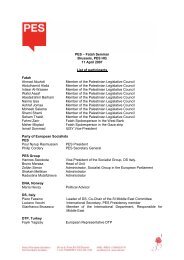Hedge funds and Private Equity - PES
Hedge funds and Private Equity - PES
Hedge funds and Private Equity - PES
Create successful ePaper yourself
Turn your PDF publications into a flip-book with our unique Google optimized e-Paper software.
124<br />
There are three countries where there is experience with PEF takeovers of incumbent telecom<br />
operators. Irel<strong>and</strong> historically has had a relatively inefficient telecom infrastructure <strong>and</strong> was<br />
hoping that privatisation would stimulate significant improvement. Denmark has always had one<br />
of Europe’s leading telecom infrastructures. As a still developing country, Bulgaria’s telecom<br />
infrastructure needs major investment in network development. More detailed information about<br />
developments in these countries is provided in the Annex of this report dedicated to Case<br />
studies.<br />
***<br />
The three country case studies of private equity involvement in the infrastructure providers in the<br />
telecom sector in Europe suggest the following:<br />
1) private equity ownership can be attracted to incumbent telecom operators that are efficient<br />
(Denmark), inefficient (Irel<strong>and</strong>), <strong>and</strong> still in need of fundamental reform <strong>and</strong> network development<br />
(Bulgaria);<br />
2) private equity ownership is not likely to foster a demonstrable efficiency improvement in a relatively<br />
inefficient operator, the network modernisation <strong>and</strong> expansion needed in a still<br />
developing country, or the maintenance of the leadership of one of Europe’s most efficient<br />
operators (Denmark);<br />
3) long term investment in network development is not an evident priority of the private equity<br />
owners of the operators in any of the countries. Short-term gains from cash payouts <strong>and</strong> profitably<br />
turning around their investments are the priority;<br />
4) the levels of debt left with the companies after the leverage buyout severely constrains long<br />
term investment capabilities for the future, <strong>and</strong> are incompatible with efficient long term investment;<br />
5) private equity ownership is an exercise in disinvestment, the removal of capital, not new investment<br />
in growth <strong>and</strong> development;<br />
6) the management of the utilities may be presented with a serious conflict of interest. Their<br />
personal rewards are greatest if they engage in inefficient practices to build cash <strong>and</strong> cashable<br />
assets that will invite private equity owners, facilitate the takeover <strong>and</strong> share in the very<br />
substantial payouts. In some circumstances, this could be a violation of their fiduciary responsibilities<br />
to the original public stockholders.




